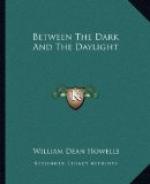“I didn’t, much. But the children understood that it took three weeks for an egg to hatch, and anyway the pullet was so intermittent in her attentions to the Easter egg, only sitting on it at night, or when held down by hand in the day, that there was plenty of time. One evening when I came out from Boston, I was met by a doleful deputation at the front gate, with the news that when the coop was visited that morning after breakfast—they visited the coop every morning before they went to school—the pullet was found perched on a cross-bar in a high state of nerves, and the shell of the Easter egg broken and entirely eaten out. Probably a rat had got in and done it, or, more hopefully, a mink, such as used to attack eggs in the town where I was a boy. We went out and viewed the wreck, as a first step towards a better situation; and suddenly a thought struck me. ‘Children,’ I said, ’what did you really expect that egg to hatch, anyway?’ They looked askance at one another, and at last the boy said: ’Well, you know, papa, an egg that’s been cooked—’ And then we all laughed together, and I knew they had been making believe as much as I had, and no more expected the impossible of a boiled egg than I did.”
“That was charming!” Wanhope broke out. “There is nothing more interesting than the way children join in hypnotizing themselves with the illusions which their parents think they have created without their help. In fact, it is very doubtful whether at any age we have any illusions except those of our own creation; we—”
“Let him go on, Wanhope,” Minver dictated; and Newton continued.
“It was rather nice. I asked them if their mother knew about the egg; and they said that of course they couldn’t help telling her; and I said: ’Well, then, I’ll tell you what: we must make her believe that the chick hatched out and got away—’ The boy stopped me: ’Do you think that would be exactly true, papa?’ ’Well, not exactly true; but it’s only for the time being. We can tell her the exact truth afterwards,’ and then I laid my plan before them. They said it was perfectly splendid, and would be the greatest kind of joke on mamma, and one that she would like as much as anybody. The thing was to keep it from her till it was done, and they all promised that they wouldn’t tell; but I could see that they were bursting with the secret the whole evening.
“The next day was Saturday, when I always went home early, and I had the two oldest children come in with the second-girl, who left them to take lunch with me. They had chocolate and ice-cream, and after lunch we went around to a milliner’s shop in West Street, where my wife and I had stopped a long five minutes the week before we went to Bethlehem, adoring an Easter bonnet that we saw in the window. I wanted her to buy it; but she said, No, if we were going that expensive journey, we couldn’t afford it, and she must do without, that spring. I showed




